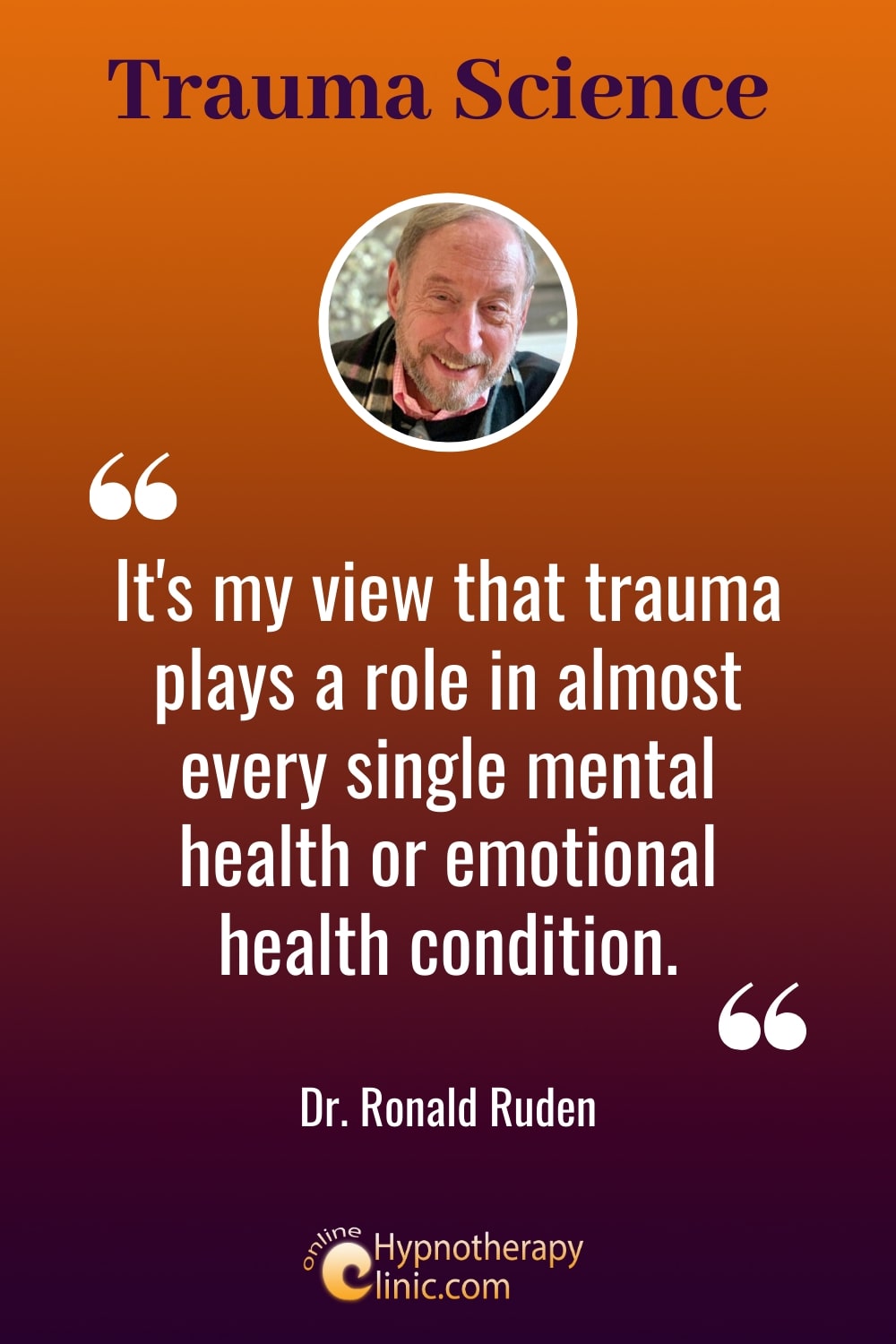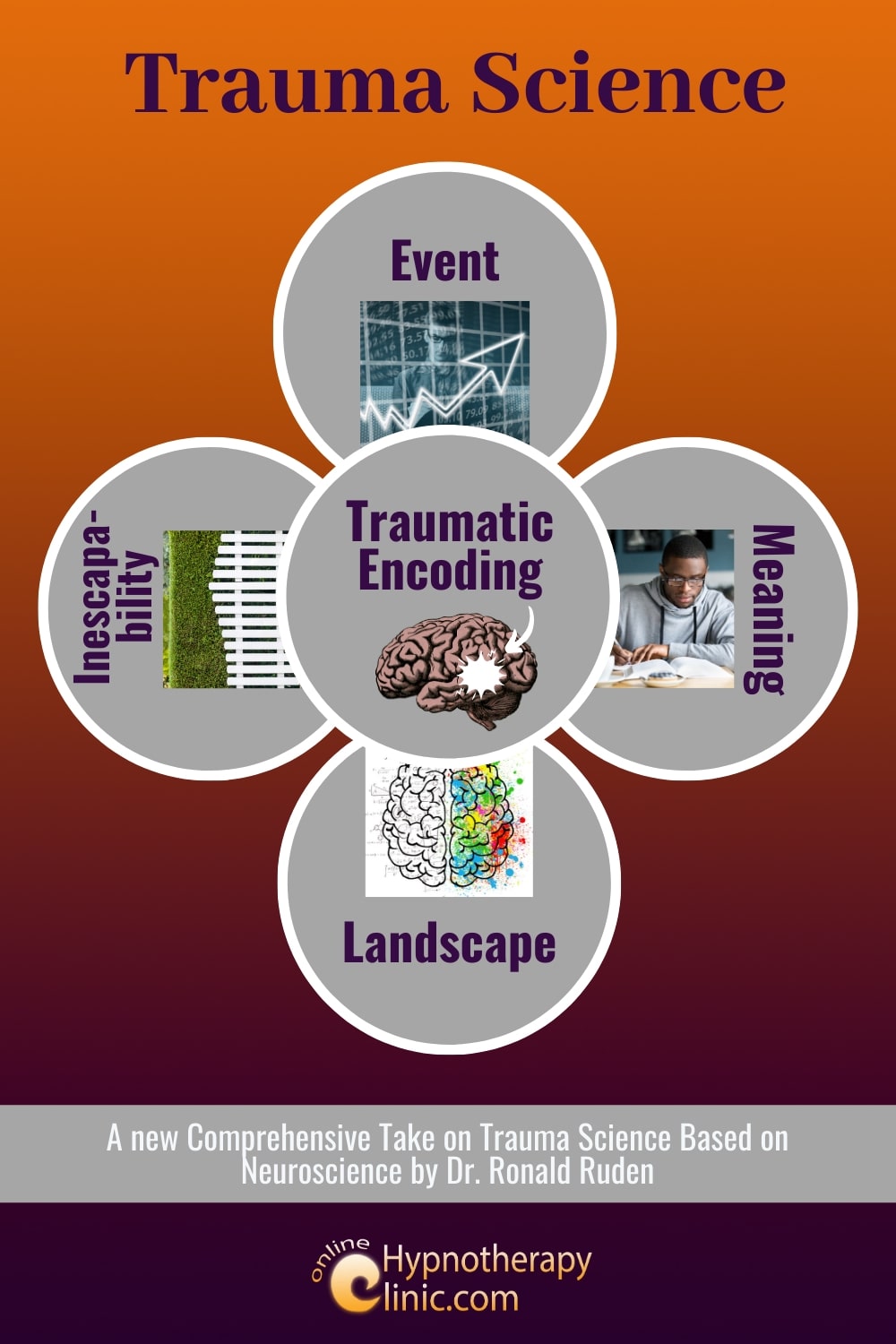Trauma Science
By Susanna Sweeney, MSC, MBACP, CHT
I interviewed Dr. Ronald Ruden, co-creator of the trauma healing modality Havening Techniques®, about his latest updates on trauma science, based on his study of neuro-science.
Dr. Ruden's take on what constitutes trauma differs substantially from the definition of post traumatic stress disorder or PTSD. His twenty year study of neuro science has led him to develop a theory of how exactly trauma is encoded in the brain, and how we can resolve this encoding.
Susanna Sweeney: Dr. Ruden, thank you so much for joining me all the way from New York City. I've invited you to have a chat with me about trauma science. You are one of the world's most renowned experts in the trauma field. And I'm looking forward to hearing your take on what trauma is and how you view the science of trauma.
Dr. Ronald Ruden: Thank you very much. Trauma, in essence is the consequence of a variety of things. It involves an event which could be either first person, second person or third person.
You can be in the fire you can witness the fire or can be told about a fire is the meaning of the event to the individual, which means it has to generate a large emotional response. It involves what we call the landscape of the brain, that is to say, the neuro-electrochemical mixture at the moment of the event.
And it involves one more thing is critically important. It involves the idea of inescapability. When you combine all of those things, something happens in the brain, which causes the permanent encoding of that event.
So that stimuli, which bring back memory of the event caused the release of stress hormones, and chronic and experiencing trauma as if it's happening for the first time.
Susanna Sweeney: Yes, and so one of the things I'm already hearing is around trauma, not necessarily being life threatening events, right?
So if we go back to the definition of post traumatic stress disorder, that is, I don't know how many years old we have lived with that in the trauma world for a long time.
And the premise has always been that it's a life threatening event, or at least at the very least, potentially life threatening events that underlies trauma.
Tell us how you are understanding and why your understanding is different.
Dr. Ronald Ruden: What you say is correct, I truly think definition of the disorder of PTSD, which is post traumatic stress disorder has inhibited the growth of understanding of trauma.
Not everything that is life threatening, is traumatizing. And that, as I said depends on those three things. Event meaning landscape, it in escape ability.
It depends on your prior experience. For example, individuals who have had early life events which have changed the way their brain has functioned, as mentioned earlier, can have a small event, which activates this process.
And that can be encoded in trauma. It becomes not the event, but what how we respond to the event, which is the important part.
Susanna Sweeney: So what you're emphasizing is there are individual factors as well. So in terms of your susceptibility to trauma, that that is very much determined by your history.
Dr. Ronald Ruden: That's correct. Everyone who experiences the same event will not necessarily experienced a traumatization of the event.
It depends on our previous experiences, the meaning of the event, the landscape event and the inescapability. And once you have all those three, four things, rather, and once you have those four things, then it becomes hospital has the potential for being encoded as a trauma,
Susanna Sweeney: Tell our audience, then what happens at that point, when such when all these four factors come together and a memory is then encoded in a traumatic way?
Find out About Havening Techniques®️
Together with his brother Dr. Steven Ruden, Dr. Ronald Ruden founded Havening Techniques®️ using the knowledge he gained from studying neurochemistry.
Having identified how trauma is encoded in the brain they went about finding ways to decode it, with the end result being Havening Techniques®️, a powerful modality for healing the impact of trauma which can be life changing. Learn more here:
- What is Havening and how could it Change your Life? An introduction to the method and what it can do...
- Havening- Interviews with the Founding Fathers: Interviews with Doctors Ronald and Steven Ruden on the origins of Havening Techniques and its development
- Self Havening: How you can use Havening Techniques at home for self help.
More About Trauma
To give you an up-to-date picture of the science behind the symptoms of trauma, I have interviewed Dr. Ronald Ruden, who has devoted many years of his life to the study of the neuroscience behind trauma.
Find out exactly what happens in the human brain at the moment of traumatization.
Find out Dr. Ruden's comprehensive, novel definition of what trauma is, based on many years of studying the neuroscience of trauma.
Dr. Ronald Ruden: Well, we believe and we speculate that the following events occur, individual receives and event experiences and, and this then becomes viewed by the brain as being a threat to the individual doesn't have to be life threatening event, but it can be just a threat to the individual.
And these threats can be loss of job, loss of relationships, anything that involves the detachment of a relationship, so that it is the loss of attachment to the relationship to the event to the body parts to any numbers. things, which is the key, it is that loss of attachment which sets the stage for meaning. And once we fear that loss of attachment, that means we saw a large emotional response.
Then, if the landscape is non resilient or ice, or as we say, the landscape is vulnerable based on prior experiences. The brain then does something to make sure we remember this event so we can avoid it again. It causes the release of stress hormones among them, cortisol, norepinephrine, dopamine, serotonin, and the like.
And as a consequence, this course is the generation of 100 parts or high frequency gamma wave, which goes into the brain. The consequences of this gamma wave is what helps encode these events. And what happens is that they become currently may only be such that inadvertent or purposeful recall of these events caused the release of stress hormones, further landscaping.
That's what we call trauma. So if I had to describe it in a simple sentence traumatization is the consolidations without the consolidation of an event, which then leads to storing of the cognitive, emotional, somatosensory and visceral components of the event at that time. And that buy on recall, whatever way we recall it, this thing called the relate to stress hormones.
Susanna Sweeney: And that's what then accounts for these powerful symptoms of trauma that people experience right where you have intrusive thoughts, you have maybe really intense nightmares, during which the trauma comes right back and it seems like it's happening right now – these powerful emotions and it feels like it's right now.
Dr. Ronald Ruden: That's correct. And I've seen cases where they've been seven decades between the event and the recall. And it still is as if it's right now. It is important and I think this is critically important. It is important to understand that the neuro electrochemical landscape of the brain during traumatization is different than that for symptom generation. That's why we see it yesterday. The symptomatology occurred many months after an event has occurred. And so that when you have a something that causes a stressor, unrelated to the encoding event, that landscapes the brain, known specifically in allows for symptoms to occur
Susanna Sweeney: Yes, and that is something that we observe, too. When I think back to my clinical practice and psychotherapy for many years, I would have seen that a lot, that after the trauma occurred initially, people could be fine for quite a while. But then, for example, maybe when it was coming up to the court case, or something else happened, some other life event happened. That's when symptoms finally set in. And they couldn't cope anymore.
Dr. Ronald Ruden: That's exactly correct. And sometimes that makes it very confusing to treat appropriately. If you're only treating the immediate event to down regulate that stress, you can actually down regulate symptoms with the underlying trauma still remains without treatment.
Susanna Sweeney: Absolutely. And that is something I would have observed too, with a lot of psychotherapy clients. You can look at lifestyles for example, you can look at addictions, you can look at all the complicating factors that have come up as a result of the trauma, and you can make changes with people on those.
But that there is an element at the very bottom of it that you might not get to even after years of psychotherapy, that there would still be this fright- the actual trauma that people would often avoid talking about all together. They would talk about everything around it, but would not talk about the actual key memory.
Dr. Ronald Ruden: That's why taking a history in trauma work is very important. It is focusing on searching out doing archaeological digging, so to speak, of trying to find out where the initial including event is, and brilliantly we have a mocker called the subjective unit of distress.
Which is a marker for telling us that other stuff is left to be dealt with. And unless we can find a way of getting the what we call the subjective unit of distress or the SGD, down to zero. That means that there's other stuff that needs to be dealt with. And it is in valuable marker for us to pursue further history taking and searching.
More About Havening Techniques®
Doctors and twin brothers Ronald and Steven Ruden have dedicated the last twenty years to researching the neuro science of trauma and using their findings in developing a novel, powerful, gentle and reliable healing modality, Havening Techniques. Find out more here:
What is Havening and how could it Change your Life?
An introduction to the neuro science based healing modality of Havening Techniques. Find out how it could benefit you in changing your life.
Havening- Interviews with the Founding Fathers
Interviews with Doctors Ronald and Steven Ruden, the founders of Havening Techniques, on the origins of the healing modality, it's underlying tenets and its development.
Learn how you can use Havening Techniques at home for self help.
New to Hypnosis
I hope you found this insight into trauma science valuable and please do follow up on the links to find out more. In the comments below, let our community know what you have learned.
Regards,

Recent Articles
-
Havening Technique Training auf Deutsch
Feb 08, 24 11:02 AM
Havening Technique Training auf Deutsch- Details und Buchung -
Client Testimonials
Oct 06, 23 06:08 AM
Client Testimonials of my Online REPAIRenting® Program that uses various psychosensory approaches for safe and quick transformation -
Smoke Free Thanks to This Amazing Resource
Aug 02, 23 09:26 AM
Oh thank you for this simple resolution to all my worries! I feel like I have had a weight lifted off my shoulders. It is like cheating on giving up smoking.



New! Comments
What do you think? Leave a comment in the box below.